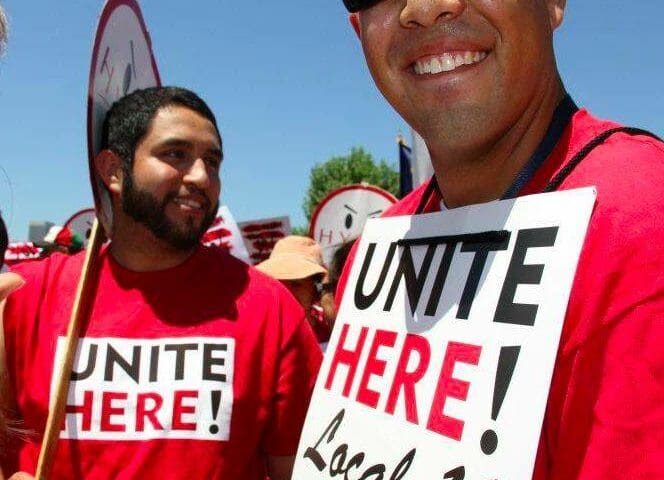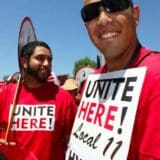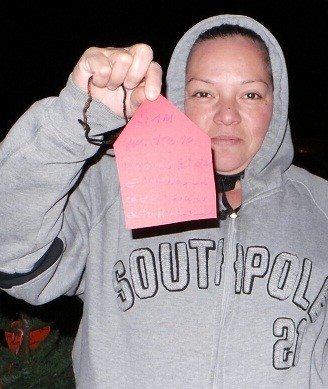LATEST NEWS


1. Protecting Families from Foreclosures. This year, California became the first state to enact reforms that ban the practice of foreclosing on a family seeking a loan modification (AB278, SB900). These bills also increased penalties for “robo-signing,” or the filing of false mortgage documents, and required banks to create a single point of contact for those seeking a loan modification.
2. Winning improvements for injured workers. California’s injured workers have suffered under slashed benefits and delayed medical treatment under Schwarzenegger reforms. Comprehensive workers compensation reform enacted this year (1) increases benefits for injured workers system-wide by $860 million or 30 percent, (2) cuts down delays in medical treatment, and (3) stabilizes the insurance market by removing inefficiencies and excess profiteering from the system. SB 863 earned strong bipartisan support and was based on Labor-management negotiations.
3. Building the High Speed Rail. As with any bold project, the voices of doom and decline said the high speed rail couldn’t be built.
» Read more about: The Year's Top Five Legislative Victories for Workers »


Please refer the Union Hotel Guide to search for recommended union hotels. Make sure to steer clear of boycotted hotels and you may wish to consider the desirability of staying at hotels that are at risk of dispute (where there are current or looming labor disputes). Be aware that this list only reflects the present status of union hotels across North America. To avoid the prospect of labor conflict during your stay at a hotel, insist on protective contractual language when you make a reservation or organize an event.
Boycott These Properties In the Los Angeles/Orange County Area
Hyatt Hotels
For more information about the Global Boycott of Hyatt, please visit hyatthurts.org
Embassy Suites Irvine
2120 Main Street Irvine, CA 92614
LAX Hilton and Towers
5711 W. Century Blvd Los Angeles, CA
Holiday Inn LAX
9901 South La Cienega Boulevard Los Angeles,
» Read more about: Don't Ring in the New Year at Boycotted Hotels »


Speaker Boehner’s debacle in failing to get his own caucus to support his “Plan B” is not only his failure, it shows the complete disarray of the congressional Republican Party. They are simply incapable of a coherent response to a problem that calls upon them to go beyond campaign talking points.
This gives the President and Democrats in the House and Senate an opportunity to set fiscal cliff policy, in two stages. First, before the end of 2012, they should pass a bill in the Senate that would end the Bush tax cuts for those earning over $250,000 per year, as the President promised during the campaign. The bill should also extend unemployment coverage for the long-term unemployed, extend the debt limit for at least a year, and adjust the Alternative Minimum Tax to inflation. It should suspend (not cancel) the mandatory across-the-board spending cuts in the Fiscal Cliff law.
The 52-47 Democratic majority in the Senate is ample to pass the bill;


Source: The Electrical Worker/IBEW


One of the proposals floated for months in the fiscal bluff debate in Washington, D.C., is a change to the formula used to measure inflation for Social Security Cost-of-Living Adjustments (COLAs) called the “chained” CPI. Let’s be clear: This is a benefit cut. These COLAs make sure seniors’ income keeps pace with the rising costs of housing and food. The “chained” CPI would cut future Social Security benefits by as much as $2,432 for someone who is 17 years old today. Studies from the Center for Economic and Policy Research (CEPR) show that not only is the “chained” CPI a benefit cut, it eventually will lead to higher taxes for most working people.
For instance, CEPR estimated that the change to the “chained” CPI would lead to a cut in benefits of three percent after 10 years, six percent after 20 years and nine percent after 30 years.
» Read more about: Chained CPI: Proposed New COLA Leaves Bad Taste »


My name is Cathy Youngblood. I work as a housekeeper at the Hyatt Andaz in West Hollywood. There are many positive things about being a housekeeper. I get to meet the world. I have a real bond with the other women I work with. I also take pride in working in a field where I give comfort and pleasure to people when they travel.
There are also challenges to being a housekeeper. Every day the work is exhausting and physically debilitating. And management doesn’t always really listen when we have ideas about how to make the work safer or more efficient.
I care about my job, but also I see how things could be better. That’s why Hyatt needs someone like me on its board of directors. The current corporate officers might have business sense, but I have common sense. They push paper, I do the physical labor.
» Read more about: Hotel Worker Says: Put Me on Hyatt's Board! »


“And it came to pass in those days, that there went out a decree from Caesar Augustus, that all the world should be taxed.”
Those are the opening lines from the Christmas story according to St. Luke, as written down by the team of scholars working under the direction of King James of England 500 years ago. Different translators have used different phrases over the centuries, but the frame for telling this story has always been taxes.
The Roman Empire wanted to make sure everyone paid their taxes, so Rome required its subjects to return to their towns of birth to sign into the national registry as part of a census, which allowed the keepers of the treasury to know who had paid and who had not. And that’s how Jesus got to be born in Bethlehem.
In California, we face a different dilemma. For decades now,


(This article first appeared on Equal Voice News.)
Rosa Rivera worked in housekeeping at the Best Western Golden Sails Hotel in Long Beach, Calif., for 20 years. In all those years, she never received health benefits, a paid vacation or a paid sick day. She often cleaned 17 to 18 rooms a day.
When Rivera heard that Long Beach voters on Nov. 6 had resoundingly approved Measure N, requiring nonunion hotels with more than 100 rooms to pay its workers at least $13 an hour and provide five paid sick days a year, she was overjoyed.
With the new wage increase, Rivera’s weekly paycheck would jump from $320 a week to $520, before taxes. She dared to dream of what it would be like to have almost $2,000 a month to live on.
Rivera, 43, shares a one-bedroom apartment with her daughters and granddaughters.
» Read more about: Hotel Grinch Lays Off Workers as Living Wage Law Takes Effect »


Maybe it’s time for the millions of American victims of gun violence to come out of the shadows and make real what guns are doing to our lives.
I’m one of those Americans. My white-haired, 82-year-old mother, after two hospitalizations for major depression, was able to easily purchase handguns from local Westside gun shops. The first time she let me know and, together with a female police officer, we took it away from her. The second time she used a gun to end her life.
I’ve often tried to picture the gun dealers who helped her make these purchases – standing behind the glass counter, advising this elderly woman on which gun would theoretically assure her personal safety. Never having used a gun in her life before, she went into the Santa Monica mountains to practice shooting it.
As we headed to my mom’s senior housing facility to retrieve the first gun,


(This post first appeared on Union Plus.)
No holiday tradition competes with the family meal. Between desserts decorated full of cheer and marvelous meats that melt in your mouth, ‘tis the season for a full stomach. Luckily for union members, members of the United Food and Commercial Workers (UFCW), the Bakery, Confectionery, Tobacco Workers and Grain Millers (BCTGM) and the United Farm Workers (UFW) have an amazing variety of ingredients such as Hershey’s chocolate and Montpelier Almonds to create the most delicious and view-licious recipes. Here are five fun holiday dessert recipes to help you be union, buy union and bake union.
Rolo Pretzel Delights (Thank the UFCW members for Rolo)
Ingredients: Small pretzels, ROLO Chewy Caramels in Milk Chocolate, Pecan halves
Directions:


(Note: This feature first appeared September 21, 2012.)
On September 14 the Web exploded with news that billionaire industrialists Charles and David Koch had donated $4 million in support of Proposition 32. A San Francisco Chronicle editorial noting the donation labeled the brothers “conservative ideologues” – a moniker often applied to the Kochs. This description, however, gives the Kochs far too much credit for their supposed philosophical purity—particularly as it relates to the Prop. 32 battle.
Despite their reputations as libertarian true believers, the Koch brothers are nothing if not practical businessmen, who have no trouble taking advantage of government subsidies when it bolsters their bottom line. (Koch Industries, for instance, was for years heavily invested in the $6 billion, federally subsidized ethanol industry.) That bottom line runs up and down the state of California, where Koch Industries has hundreds of millions of dollars invested through its subsidiary Georgia-Pacific—a gypsum,
» Read more about: Classic Koch: How Prop. 32 Could Enrich Two Billionaires »


President Obama must remember the message of election night and back away from cutting Social Security benefits.
That didn’t last nearly as long as I had hoped. I put on my Obama baseball cap – the one I picked up from a street vendor walking to the inauguration four years ago – a few weeks before the November election. I’ve worn it every day since, to both celebrate his victory and cheer on the president for keeping to a progressive promise in the fiscal negotiations. Part of that promise was telling the Des Moines Register that Social Security benefits should not be cut. But it looks like my cap is going back on the shelf if reports that Obama is willing to cut Social Security benefits prove to be true.
There are three things to keep in mind about the president agreeing to cuts in Social Security benefits.


As the economy slowly rebounds, we need to ask what kind of recovery we want in Los Angeles.
Experts point to tourism as a key industry poised to help drive recovery and growth in our region. The potential is certainly there. Tourism is the largest employer in Los Angeles, accounting for one in ten jobs. And hotels in particular have recovered past pre-recession levels, with projections for strong growth. Industry analysts PFK Hospitality Research forecast revenue per available room in Los Angeles to grow by an average of 5.6 percent per year over the next five years – on top of an 11.7 percent increase this year. (For comparison, the long-run average is 3.3 percent.)
However, jobs in hospitality and tourism come in very different shapes. Some of our large hotels succeed while paying good middle-class wages and benefits. Others offer only poverty jobs that leave workers struggling to support themselves,
» Read more about: The Economy Improves — Will the Minimum Wage? »


This past year saw an election cycle in which democratic voting rights were in question to a very troubling extent, despite claims by proponents of voter ID laws and limitations on early voting –however implausible–that they were concerned with the integrity of democracy. At least Californians could take some comfort in the fact that the state defied national trends and made it easier to register, not harder (or impossible) to vote.
So for me, as an Angeleno, it was both jarring and eye-opening to hear the recent debate surrounding a mail-in election on new taxes to pay for a streetcar loop in downtown Los Angeles. I say jarring and eye-opening because some of the arguments combined a modern confusion with a very, very old prejudice about democracy. It was a reminder that we should never assume democratic principles are secure and beyond doubt.
A little background is in order.


Every year I watch A Christmas Carol on TV to remind myself not to give in to the frustrations born of shopping, traffic and rushing from one holiday gathering to the next. Whether we are religious or not, the holiday season is an opportunity for all of us to be grateful for what we have and to share our good fortune and good will.
Oh yes, it’s a timely story, but I’ve also often taken comfort in the fact that it’s a story from a bygone era—19th century England, with all the horrors of the economic injustice characteristic of the pre-union Industrial Revolution. Thank God we’ve progressed to a better time than that!
Or have we? Imagine my surprise when I heard about the response of some Long Beach hotel owners to that city’s new living wage law for workers at the city’s largest hotels (100 rooms or more).


Labor 411’s Test Kitchen is just in time for the holidays! We’re sharing a recipe for Homemade Eggnog, which is THE traditional holiday beverage. We’ve got a recipe to make it using all union-made ingredients – and you’ll find the union brands listed next to each item. This quintessential holiday beverage is perfect to share with your friends and family.
Be forewarned: This recipe contains a little bit of alcohol. Do not consume alcohol if you are underage.
Eggnog Ingredients
6 eggs (separated) – Alta Dena, Horizon
3/4 cup sugar – Domino Sugar, Sugar in the Raw
1 pint heavy cream – Alta Dena, Horizon
1-1/2 (1.5) quarts milk – Alta Dena, Horizon
(or 1 quart milk + 2 cups whiskey) – we suggest Knob Creek
½ cup rum – Bacardi
Directions
Beat egg whites until fluffy,


A few years ago, I was pulled over by the police. I’d reported my car stolen some months earlier and they’d never taken that report out of the system after I’d gotten it back. It was a minor error on their part, but it resulted in a fairly scary moment.
I pulled into a parking lot and noticed a police car behind me, lights on. The officer told me to put my hands out of the car, and open the car from the outside, like on television. When I got out, his gun was pointed at me, and I was handcuffed and placed in the backseat of his car. A few minutes later, he brought me my three-year-old son.
My son, understandably, was terrified, and though the officers cleared up the mistake in a few minutes and bought him a toy (a miniature police car) at the toy store we were going to,
» Read more about: L.A. Schools: Under the Gunman's Shadow »


Today The New York Times dropped the other shoe of its investigation into charges of Walmart bribery in Mexico. In some important ways, that second shoe is going to sound even louder than the first. This past April The Times reported how, in 2004, a former Walmart employee became a whistleblower and informed the retail giant’s top brass that systemic bribery had been Walmart de Mexico’s default mode when it came to obtaining building permits and other forms of government cooperation. The executives in Bentonville, Arkansas ordered an internal investigation – but cut it short after the whistleblower’s charges were proved true.
Now The Times’ own investigation, which picked up where Walmart’s was unceremoniously canceled, reveals how the company showered bribes on Mexican officials to overcome zoning prohibitions against building a Walmart supermarket close to that country’s cherished pyramids at Teotihuacán.
» Read more about: N.Y. Times Story Reveals More Walmart Bribery »


The looming fiscal cliff has prompted renewed debate over the idea of a carbon tax – a way of putting a price on the carbon pollution that leads to climate change. Some say a carbon tax would raise funds that would create jobs and boost the American economy while helping to tackling climate change. Others warn it would give government too much control over the energy sector.
Here in California, we didn’t wait for the folks in Washington to make up their minds – we’re already implementing a carbon price. Our landmark clean energy and climate law, AB 32, led to a successful first auction of greenhouse gas pollution credits that raised $290 million for the state in November. These funds will go to a variety of investments in energy efficiency, greener infrastructure, clean energy jobs, and other priorities that focus on making life better for all Californians.


It was the centerpiece of the president’s re-election campaign. Every time Republicans complained about trillion-dollar deficits, he and other Democrats would talk jobs.
That’s what Americans care about—jobs with good wages.
And that’s part of why Obama and the Democrats were victorious on Election Day.
It seems forever ago, but it’s worth recalling that President Obama won re-election by more than four million votes, a million more than George W. Bush when he was re-elected—and an Electoral College majority of 332 to Romney’s 206, again larger than Bush’s electoral majority over Kerry in 2004 (286 to 251). The Democratic caucus in the Senate now has 55 members (up from 53), and Republicans have eight fewer seats in the House than before.
So why, exactly, is Washington back to obsessing about budget deficits? Why is almost all the news coming out of our nation’s capital about whether the Democrats or Republicans have the best plan to reduce the budget deficit?
» Read more about: Congress: Create Jobs Instead of Cutting Debt »